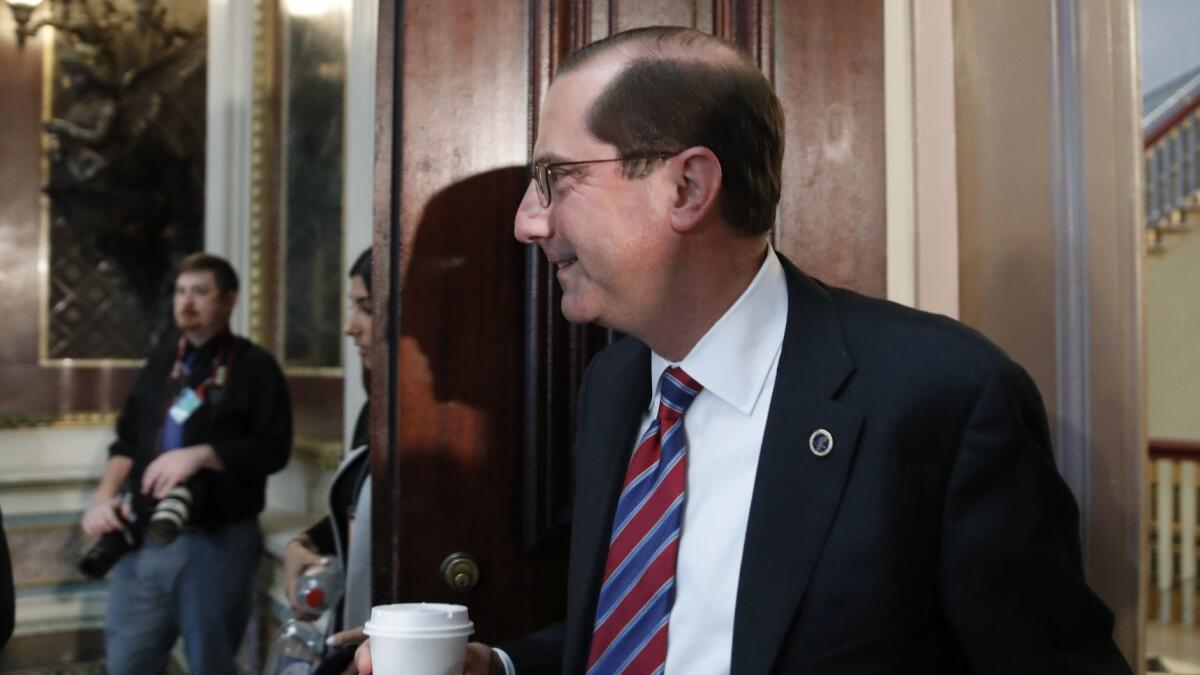Column: Despite a judge’s disapproval, Trump administration is doubling down on Medicaid restrictions

- Share via
In the real world, it has become clear that placing restrictions such as work and reporting requirements on Medicaid is disastrous.
They’re legally dubious, for one thing — as a federal judge stated in late June when he tossed out work requirements imposed in Kentucky.
More important, they lead to needy beneficiaries being thrown off the program and locked out of healthcare for lengthy periods, often because of confused regulations and the natural uncertainties of life in a low-income environment. The best evidence for that comes from Arkansas, where thousands of residents may lose their eligibility for Medicaid for no good reason — and may not even know they’ve been barred until they go to a doctor and get turned away.
Arkansas is shedding enrollment.
— Joan Alker, Georgetown University
In the Trump world, however, this is all to the good. “We are fully committed to work requirements and community participation requirements in the Medicaid program,” Health and Human Services Secretary Alex Azar told an audience at the right-wing Heritage Foundation in July, a few weeks after the Kentucky ruling. He said his agency would keep encouraging states to devise new restrictions. “We will continue to approve plans, we are continuing to work with states and we’ll drive forward.”
“They put out guidance early this year and said they’re open for business,” says Joan Alker, executive director of the Center for Children and Families at Georgetown University. “They’ve continued to encourage states to go forward, despite clear evidence from Arkansas that not only will folks lose coverage, but the system itself is not working.”
There are no legitimate rationales for employment as a precondition to receiving Medicaid, which is strictly a healthcare program; they’re merely an expression of malevolence toward a vulnerable low-income population. There is a relationship between health and employment, but it goes the other way: Good health enhances a person’s ability to find and hold a job.
Some states are trying to circumvent one of the objections of the federal judge in the Kentucky case, which is that HHS didn’t pay sufficient attention to Kentucky’s admission that its work requirement would lead to disenrollments of as many as 95,000 residents (patient advocates say the real figure is much higher). So they’re leaving out any estimates of the enrollment impact of their work requirements or other restrictions.
“They’re hiding the ball,” Alker says. But leaving out such a critical projection “obviously is out of compliance with federal requirements for public notice.”
More restrictions may be on their way. Applications have been filed for Medicaid work requirements by Arizona, Maine and Wisconsin, the last of which also has asked to impose a drug-testing requirement on Medicaid applicants as a condition of eligibility. The requirement — unprecedented for Medicaid in any state — originally was proposed in 2017 by Republican Gov. Scott Walker.
Those states are asking to impose the rules on Medicaid expansion under the Affordable Care Act, but Alabama, Oklahoma and South Dakota, which haven’t expanded Medicaid, also are seeking to add work requirements to traditional Medicaid, which covers families with children.
Wisconsin since has pared back to a requirement that applicants disclose current or prior drug use or treatment, but without basing eligibility decisions on the disclosure. HHS may be looking kindly on the more limited rule, according to Dan Diamond of Politico, but patient advocates say it still could discourage people from applying. Drug testing for Medicaid is illegal, according to Andrea Callow of the advocacy group Families USA.
“Not even close,” Callow wrote in December. Though the law allows states to apply to waive eligibility requirements to promote enrollments, she added, “deciding whether someone can get Medicaid based on whether they receive a drug test isn’t waiving an eligibility requirement, it’s creating a new one.”
The most popular eligibility obstacle proposed by red-state governments is the work requirement. The Arkansas rule, which went into effect June 1 and is being phased in month by month to expanded categories of enrollees, has deprived thousands of people of coverage for which they are plainly eligible, the Georgetown center says. Enrollees who have failed to meet the work requirements or to report their work status properly for three months are locked out of the program through the end of the year.
“Most are likely to become uninsured,” Alker’s group says. That “makes little sense from a health policy perspective — forcing people to be uninsured will result in less access to needed prescriptions and other treatments that can help to control chronic conditions such as asthma, diabetes and hypertension.”
According to the state’s most recent monthly report, issued Tuesday, just over 46,000 Medicaid enrollees were subject to the work requirement in July. Enrollees must work 80 hours a month or show they’re in school, volunteering or looking for work, unless they’re disabled or care for dependent children at home.
The state’s figures show that more than 5,400 enrollees already have accumulated two months of noncompliance — two strikes — and therefore risk being shut out of Medicaid on Sept. 1.
Of the roughly 46,000 people subject to the work requirement, about 30,000 were notified that they were exempt. But the rest — more than 15,000 were required to go online and report their work histories or request an exemption. Only 844 did so, however. In all, 12,587 people, or 83% of those expected to report, took no action.
Georgetown observes that the state hasn’t made it easy for Medicaid enrollees to report their work histories or seek an exemption. The report can only be made online, via a website that operates between 7 a.m. and 9 p.m. A large percentage of low-income Arkansas residents have no internet access at their home; more generally, Arkansas ranks near rock-bottom among the states for broadband service.
It’s also possible that many enrollees aren’t aware of their status because the state’s notification letters haven’t reached them; living arrangements in low-income communities often are unstable. “If Arkansas sends out a letter and the address is wrong, they just kick them off,” Alker told me. “Arkansas is shedding enrollment.”
In his June 29 ruling, federal Judge James E. Boasberg of Washington, D.C., found that Azar’s HHS rushed approval of Kentucky’s uniquely punitive Medicaid work requirements without seriously considering how they would fulfill Medicaid’s statutory purpose of bringing affordable healthcare to low-income households.
Citing the state’s projection that 95,000 of Kentucky’s 1.2 million Medicaid enrollees would lose their eligibility within five years under the new rules, the judge found that Azar “paid no attention to that deprivation.” That made his approval of the program “arbitrary and capricious.”
How hasty was Azar? HHS issued a letter to all governors expressing its receptiveness to work requirements on Jan. 11, 2018, and approved Kentucky’s application on Jan. 12.
Keep up to date with Michael Hiltzik. Follow @hiltzikm on Twitter, see his Facebook page, or email [email protected].
Return to Michael Hiltzik’s blog.
More to Read
Sign up for Essential California
The most important California stories and recommendations in your inbox every morning.
You may occasionally receive promotional content from the Los Angeles Times.











